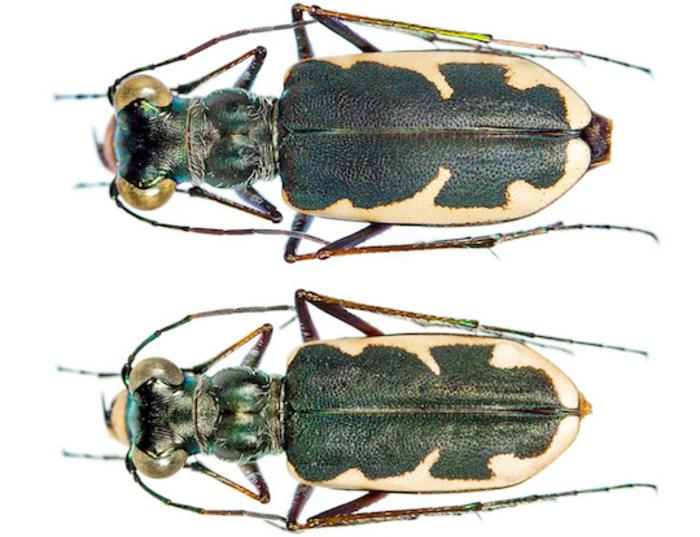Rice University evolutionary biologist Scott Egan and his research team have unearthed a new species of tiger beetle, deemed Eunota houstoniana, honoring the Houston region where it predominantly resides.

Credit: Photo courtesy of Rice University
Rice University evolutionary biologist Scott Egan and his research team have unearthed a new species of tiger beetle, deemed Eunota houstoniana, honoring the Houston region where it predominantly resides.
The team employed cutting-edge genetic sequencing technology alongside traditional measurements of their physical appearance and geographic range data to redefine species boundaries within the Eunota circumpicta species complex. This approach, known as integrative taxonomy, allowed them to identify distinct biological entities previously overlooked.
The study is published online in Nature Scientific Reports.
“It is amazing that within the city limits of Houston, we still don’t know all the species of insects or plants we share our region with,” Egan said. “I’m always interested in learning more about the biodiversity of the Gulf Coast.”
The Eunota houstoniana was once considered synonymous with the more common Eunota circumpicta, but the team’s research revealed significant differences, emphasizing the need for a refined process to species delineation.
Eunota houstoniana exhibits distinct genetic and physical characteristics. It is slightly smaller in size, its metallic coloring is more subdued, and it has unique behavior and habitat preferences.
Moreover, the new species gravitates towards saline soils often found near salt domes and oil extraction sites along the Gulf Coast. Its habitat ranges from coastal regions to inland areas, showcasing its adaptability and ecological significance.
The discovery of Eunota houstoniana underscores the urgency of biodiversity conservation. Its habitats are increasingly jeopardized by urbanization and agricultural or industrial activities, and although newly discovered, Eunota houstoniana is likely a threatened species, according to Egan.
“Because of all the growth around Houston, some of these populations have likely gone extinct while others have been hiding right out our back door,” Egan said.
Egan’s research team for Eunota houstoniana includes lead author Dan Duran, department of environmental science at Rowan University; Robert Laroche, ecology and evolutionary biology Ph.D. student at Rice; Ethan Bull, undergraduate student at Rice; David Herrmann from Dallas; Will Godwin from Sam Houston State University; and Steve Roman, collection of arthropods at Florida State University.
In a related project, Egan and Laroche recently described another new species from the same genus, the Eunota luecophasma, or the white ghost tiger beetle from West Texas, further highlighting the diversity and importance of these creatures in our region.
“Hopefully, our integrative approach to species delimitation becomes the standard for the field of biology, where, unfortunately, many organisms have not had the same level of attention that the charismatic tiger beetles have had,” Laroche said.
Eunota houstoniana marks the 17th new species described by Egan and his collaborators during his 11 years at Rice. His work at Rice since 2013 has been instrumental in uncovering and describing previously unknown insect species in the state.
In Texas, there are around 62 known species of tiger beetles, but that is likely an underestimate of the diversity that exists, according to Egan. By identifying and documenting such species, researchers like those in Egan’s laboratory provide essential groundwork for conservation efforts.




